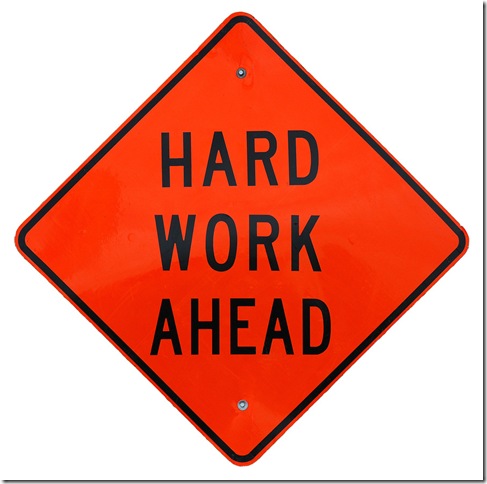
As I mentioned in a previous post, I just presented to one of the largest gatherings of job seekers in the Los Angeles area. The program was sponsored by the Catholic Arch Diocese and Interfaith Council.
Thousands of job seekers showed up who were desperate, not sure what to do next, and had been our of work for 6-12 months or more.
I don’t know about you – but I couldn’t handle being out of work for a year – and the bad news is that the job market will likely stagnate or get worse before it starts to turn around. It’s likely to be a year or more before we see a significant improvement in the job market.
Difference for coached/non-coached job seekers
This morning I started to think about what is one of the key differences between the executives I’m coaching in their job search, and those who showed up for the job search conference titled HOPE WORKS!
The key difference is that the job seekers I’m working with are getting coaching and the others are not. Allow me to be more specific:
Almost every executive candidate we have agreed to take on to conduct job search coaching has found a job within 90 days. By the 30 day mark, they are getting numerous leads, referrals, and interviews scheduled. In addition to real job opportunities, they are typically deluged with temporary and consulting opportunities. By the 60 day mark, they have a continuous stream of abundant job leads, referrals and opportunities. Their pipeline is full to the point of overflowing and they are overwhelmed with the response from their expanding network.
These candidates who are being coached have hundreds of job search tasks and activities and the combination of all those best practices is yielding great outcomes.
Conversely, the candidates not using coaching are floundering, frustrated, and not sure what to do next. Many have actually lost hope and have taken themselves off the job market.
Why are you not using job search coaching?
So, why are you not using coaching to help you in your job search?
I don’t mean the soft kind of career coaching that helps you figure out what you want to be when you grow up – I’m talking about the nitty-gritty, hardcore, focused effort around finding a great job in your specific niche.
You’ll invest in coaching for your kids piano lessons, baseball, basketball, and math tutoring – but you’re unwilling to invest in yourself to find a great job quickly.
I don’t get it.
I don’t see the logic.
Many of you might say “I can’t afford job search coaching”
Keep in mind the cost of effective job search coaching is inconsequential compared to the lost income of not being employed for another 6-12 months.
Let’s break it down into simple math. Let’s assume you earn $120k per year. If you go another 6-12 months without landing a job – which is very likely unless you’re generating at least 2-3 interviews a week right now – you’re going to be out-of-pocket $60-$120k in savings. Can you afford to do that?
What would you invest in yourself if you could cut that time in half and save $30-$60k?
It’s nothing more than a cost/benefit equation.
Okay – there is one huge issue bigger than the cost – picking a coach that has the proven ability to help you find a job within 3-6 months at the executive level.
Most job search coaches are useless – they don’t understand the process of networking, leveraging social media, blitzing an opening, having multiple strategies, and circumventing HR and recruiters to get to the hiring manager. As one example, most job search coaches tell you that it’s important to network, but they can’t walk you through step-by-step the 50 different things you have to do to generate an abundance of job leads and referrals.
Has this been your experience or frustration?
Self-Assessment of your job search
If you would like to see firsthand the value of good job search coaching, take our FREE Job Search Plan Assessment which you can download by clicking here. If you’re not hitting in the top 90% on your self-assessment, you desperately need job search coaching to accelerate and improve your job search plan. If your current job search coach is NOT covering everyone one of these issues, it’s time to make a change.
EVERY SINGLE DAY that goes by in which you don’t substantially improve your job search techniques, strategies, and tactics – means that you can basically add another week to the length of your job search. For example, if you HAVE NOT made huge leaps forward in your job search over the last 5 days, you can count on your job search taking another week tacked on to the end of 6, 12, or 18 months.
How many weeks are you going to add onto your job search, before you decide to invest in yourself like your parents did when they hired coaches/tutors for you when you were young, or like what you do now with your children.
STOP
STOP being in denial about how hard it is to conduct a job search!
STOP thinking you have all the knowledge to conduct an effective job search!
STOP thinking you have the internal discipline to stay focused on conducting an effective job search all by yourself!
STOP thinking in terms of fees for a job search coach, and start thinking about minimizing your lost income!
If you’re seeking a $100k or above level job, you owe it to yourself to find a great job search coach and immediately cut in half the time it’s going to take to find an outstanding career opportunity.
Barry Deutsch
PS – Once again, you can download the FREE Job Search Self-Assessment by clicking this link. If you’re not conducting an effective job search, perhaps now is the time to consider investing in a job search coach before you waste another 2-3 months.








